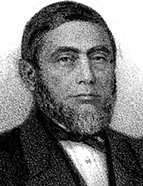

João Francisco Lisboa contributed to the debates that then guided Brazilian scholars in their quest to define how the history of Brazil should be written. His texts contain reflections on the best periodisation of national history, the meaning of Portuguese colonisation, the place of indigenous peoples and Africans, how to treat documents, and what objects a philosophical history should encompass. In his “Apontamentos, Noticias e Observações para servirem à história do Maranhão” (Notes, News and Observations for the History of Maranhão), published during the first phase of the Jornal de Timon, for example, it is possible to identify how Lisboa employs a series of principles for writing history based on his confrontation with colonial chroniclers. His criticism of Bernardo Pereira de Berredo’s Annaes (1718-1722) is structured around an opposition between “chronicle” and “philosophical history,” as these were understood in mid-19th century Brazil. According to Lisboa, Berredo sought to adopt a pompous and noble style, when his subject matter would have required a more dry and objective style, in accordance with the principles of verisimilitude of a new historical sensibility. The division of chapters in Berredo is also criticised for referring to the epic model, far removed from what would be required of a historical narrative keen to understand the historical process of the formation of colonial society. Finally, for a correct understanding of history, instead of focusing on the great object that characterised the classical historiographical tradition, namely war, Lisboa affirms the need to thematise the objects proper to a philosophical history, namely agriculture, trade, population and customs.
Another topic that permeates his writings concerns the indigenous question, a politically sensitive and much-discussed topic at the IHGB. While Lisboa positioned himself in his early writings in favour of Portuguese colonisation and sceptical about the possibility of civilising the indigenous peoples, he later became one of the greatest accusers of historical violence against those populations, leading a famous dispute with the author of the General History of Brazil, Francisco Adolpho de Varnhagen (1816-1878). It was on the authority of the disciplinary protocols of historical criticism and his experience in Portuguese archives that Lisboa based his argument. The careful study of unpublished documents, therefore, allowed Lisboa to assert historical facts that proved the acts of violence that marked Portuguese colonisation. The dispute, however, was not limited to the definition of factual issues, but also to moral principles that should guide (or veto) the work of the historian. Just as important as defining the uniqueness of the facts was a certain recognition that the writing of history was also a moral act, whose implications could not be disregarded. In the case of the criticism of Varnhagen, this principle was expressed in the delegitimisation of a conception of state violence as a factor of civilisation, dear to the author of General History. For Lisboa, using a liberal argument, praising this type of political action would not only mistakenly associate “civilisation” and “violence”, but would also expose all citizens to the same logic: “If you want war and slavery to convert and civilise the savage, you will soon have to admit, willingly or unwillingly, the use of force, iron and fire to cultivate the spirit and regulate the conscience of civilised man” (Crônica Política, 1984, p. 241). For Lisboa, Brazil’s history was marked by harmful colonisation, with “confusing, incomplete, contradictory, oppressive laws”; in which officials and governors filled their time with “political and private intrigues and machinations” and whose citizens organised themselves around “rival and reluctant powers, useless for oversight and balance, admirable for conflicts, riots and revolts” (Obras, 1865, Vol. III, p. 172). Similarly, sharing the anti-Jesuit sentiment of his contemporaries, Lisboa viewed the actions of the Society of Jesus in a very negative light, marked by political and economic interests. Even Father Antonio Vieira, although recognised for his oratory and literary qualities, was strongly criticised for his secular ambitions for notoriety and power. Although Brazilian history had some positive experiences, such as the Beckman revolt, the harmful aspects of colonisation were much more decisive in shaping its political and social formation. Even the changes brought about after independence served more to ensure the continuity of that system than to promote the emergence of a new society. In this sense, the implementation of representative political forms, via the electoral system, could not find the conditions necessary for its full functioning.
This work is financed by national funds through FCT - Foundation for Science and Technology, I.P, in the scope of the projects UIDB/04311/2020 and UIDP/04311/2020.
